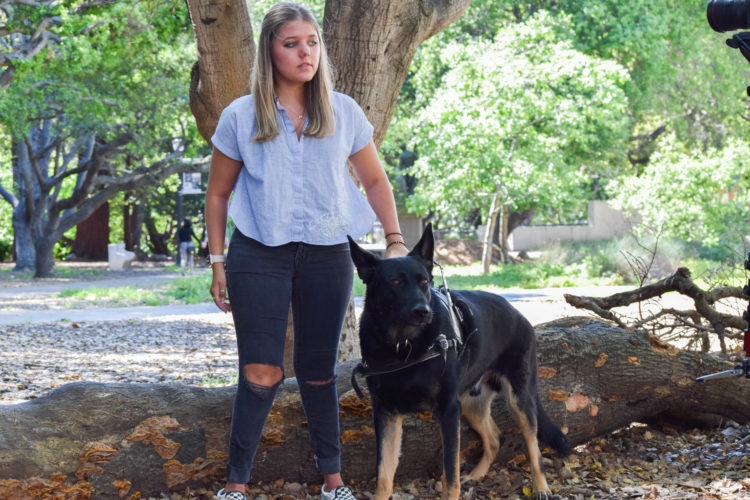
Freshman Tabitha Bell gets around the Berkeley campus with the help of Nox, and if others need a service dog, she’d like to help. (UC Berkeley photo by Irene Yi)
Tabitha Bell was 12 years old when doctors told her that progressive weakness and loss of muscle mass would so ravage her body that she’d have to use a wheelchair or hand crutches.
They were wrong.
Today, Bell, a freshman at UC Berkeley, gets around just fine — with the aid of a service dog. And she’s connecting others struggling with mobility by helping them get service dogs, too.
Bell is executive director of Pawsitive Pawsibilities, a 5-year-old foundation that has placed service dogs with nearly a dozen people across the country. And while Bell is studying political economics and French at Berkeley, she’d like to bring the full scope of the foundation’s efforts to the Bay Area. The foundation is based in Sandy, Utah, where Bell attended high school.
“I got my first dog when I was 12 and right out of spinal surgery,” Bell says. Doctors predicted she’d need mobility aids by high school, she adds, but “I didn’t like that idea.”
A year later, she wowed her doctor by walking the length of a hospital corridor with the help of her dog, Sunny. The doctor was impressed enough to say, “I could use 20 more of these dogs.”
Bell made that her goal . She went on to successfully do fundraisers for the project in Utah that included concerts and 5K runs, and she has hopes to continue that work in Berkeley. In the works now is a 5K run when students are back in school in September.
And she’ll have allies.
“We know that service dogs can aid the independence of many people,” Karen Nielson, executive director of the campus’s Disabled Students’ Program, says. “DSP supports (Bell) in any way that we can.”
For now, the program is financed by Bell’s fundraising efforts and with the help of an anonymous private donor. Bell says the cost of raising and training a service dog runs between $10,000 and $20,000.
Berkeley became the desired college destination for Bell after a one-day tour of the campus with her older sister in 2017.
“It just felt so inclusive; I felt like I was home,” Bell says. “And when I went to the DSP, they were like `Oh, yeah, we can totally accommodate you.’ After that, it was my dream school.”
Schools hadn’t always been so welcoming. Bell was in the fourth grade when she was diagnosed with a type of muscular dystrophy. Over the course of the next four years, doctors would narrow it down to Charcot-Marie-Tooth disease (CMT), but, even now, a complete diagnosis hasn’t been made.

When he isn’t helping Tabitha Bell around the Berkeley campus, Nox seems more than content to sit at her feet and watch the world (UC Berkeley photo by Irene Yi)
Her family lived in San Diego, and by eighth grade, after the diagnosis, they began looking for a service dog because, Bell says, “I didn’t like the idea of being in a wheelchair.” Sunny, a German shepherd and Belgian Malinois mix, became a fixture in her life.
Her high school, Horizon Prep in Rancho Santa Fe, north of San Diego, was OK with the wheelchair, but wouldn’t allow Sunny to cross the threshold. “I was the odd girl out,” Bell says.
So, for the school year, Bell and her mother moved to the family’s summer home in Sandy, Utah, where the Waterford School was more than welcoming.
And it was while she was at Waterford that Bell, her sister Hannah and her best friend Morgan Kane decided one service dog wasn’t enough. So, they founded Pawsitive Pawsibilities. And while Bell focused on getting service dogs for others, she also needed a new companion when it was time to head to Berkeley. Sunny was deemed too old to move to the Bay Area.
New on the job since last summer is Nox, a purebred German shepherd that’s a genteel soul, but huge at 110 pounds.
“He’s a lot bigger than Sunny,” Bell says. “He’s good for me in this stage of my life. He’s much more outgoing with people, and he is much stronger. And I’m a lot stronger and more confident, too, so it’s a good match. I could not have handled him when I was 12.”
During this decade, Bell’s had 10 surgeries, including seven on her feet and one on her spine. As recently as February, she had gallbladder surgery. But Bell is up, moving well around campus and feeling strong.
“I’m improving because I work out four days a week,” Bell says. “I do a lot of physical therapy to keep my strength. When I was first diagnosed, they told me, ‘Don’t even try to build muscle, because the more you build, the faster it is going to deteriorate.’ But CMT isn’t like that. It’s a neurological disease that affects nerves. That doesn’t mean I can’t build muscle. I do it in small increments. I do it a lot, it helps, and this is the strongest I’ve ever been.”
Bell says she’s only seen a few service dogs on campus this school year. That gets her to wondering, if more such animals were available, whether more deserving students could get a Berkeley education.
“Out of 30,000-some students, I’ve only seen a few other service dogs. Two were seeing-eye dogs, and one was a wheelchair assistance dog,” she says. “I take Nox to my classes, he comes in with me, sits at my feet and falls asleep. Everybody has been very accepting of him.”

